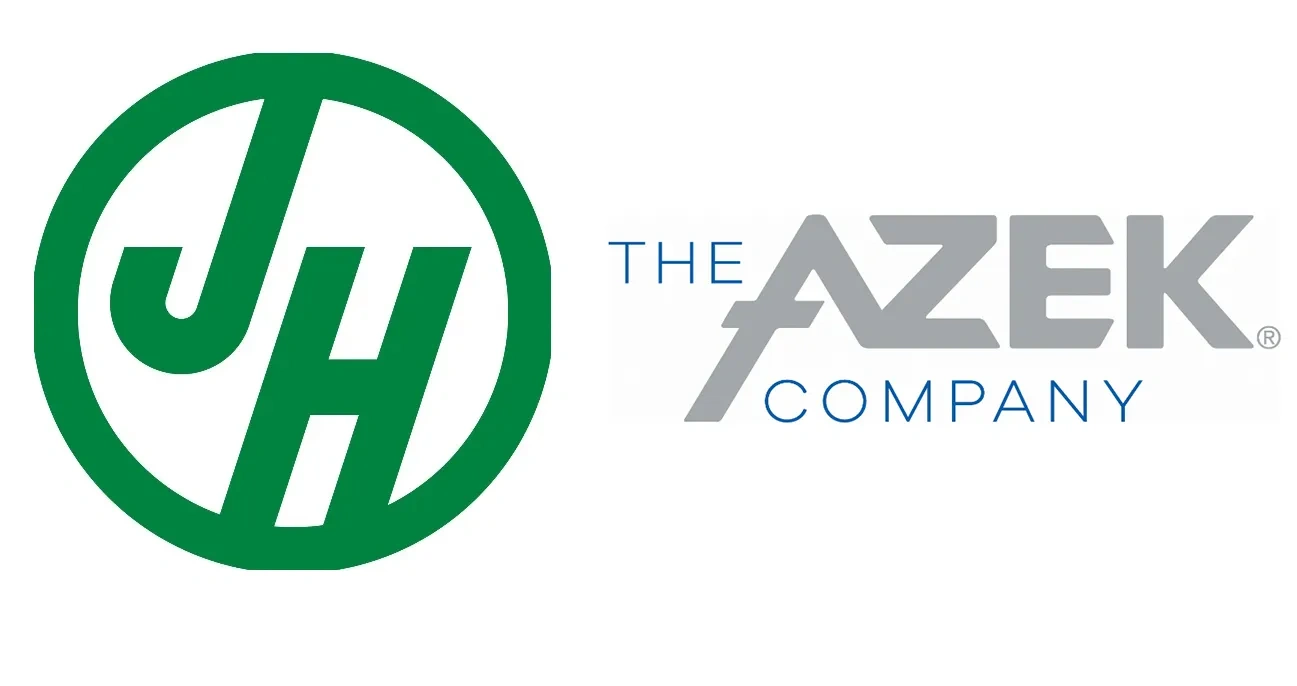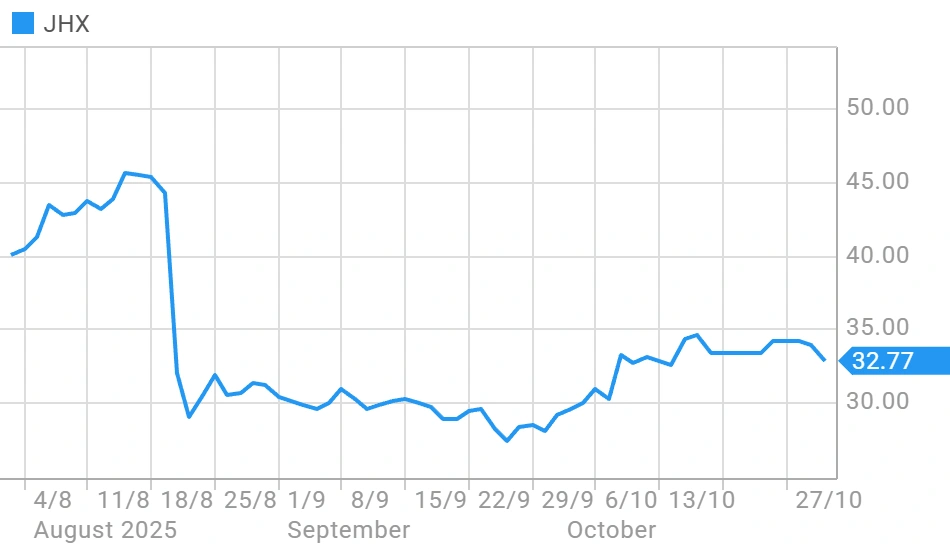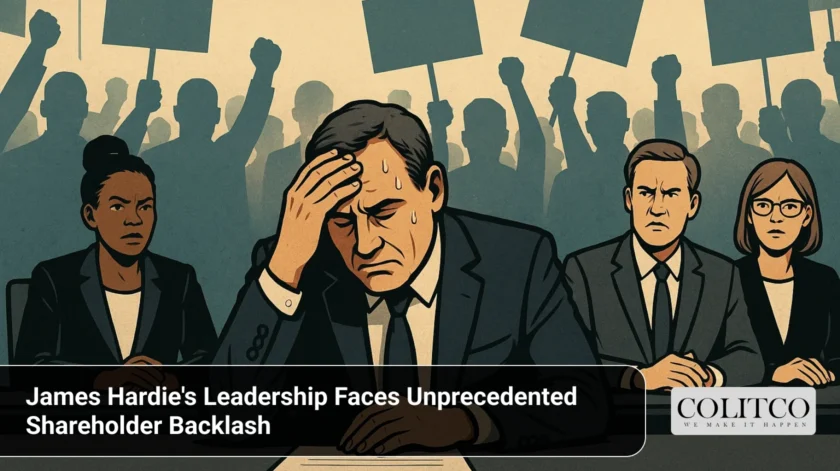In a stunning rebuke that lasted just 17 minutes, shareholders of building materials giant James Hardie Industries (ASX: JHX) delivered a crushing blow to the company’s leadership at Wednesday’s Annual General Meeting in Dublin.
Chair Anne Lloyd was ousted from the board after 67% of proxy votes opposed her re-election, marking one of the most dramatic shareholder revolts in Australian corporate history.
Lloyd wasn’t alone in facing investors’ wrath. Directors Rada Rodriguez and Peter-John Davis also failed to secure majority support and will depart the board.
The Deal That Sparked the Fury
The board upheaval stems directly from James Hardie’s $8.4 billion acquisition of US home-decking provider AZEK Company, which closed in July 2025.
What made this deal particularly contentious wasn’t just its size but how it was executed.
 James Hardie Acquired Azek
James Hardie Acquired Azek
James Hardie received a waiver from the Australian Securities Exchange (ASX) that freed it from holding a shareholders’ vote on the transaction. This procedural manoeuvre allowed management to push through a transformational deal without formal shareholder approval.
The market response was brutal:
- James Hardie shares plunged 32% in 2025
- The company’s market capitalisation shrank by $6 billion
- Share price fell from a 12-month high of $58.82 to $33.87
Norway’s $2 Trillion Fund Joins the Revolt
Days before the AGM, Norway’s Government Pension Fund Global, managing $2 trillion in assets, announced it would vote against Lloyd and most board directors, arguing “shareholders should have the right to seek changes to the board when it does not act in their best interest.”
The Norwegian fund, which owned 1.35% of James Hardie before the merger, represented a powerful institutional voice in the growing chorus of dissent.
First Strike on Pay
The shareholder rebellion extended beyond director elections. Roughly 66% of proxy votes rejected the company’s remuneration report, delivering a first strike under Australian corporate governance rules.
Investors also voted down proposed pay rises for non-executive directors.
Lloyd Defends the Deal Despite Ouster
Despite the overwhelming rejection, Lloyd maintained that combining AZEK with James Hardie was a strategic decision designed to promote long-term growth.
At the brief Dublin meeting, Lloyd acknowledged: “The board acknowledges the significance of these outcomes and will engage with shareholders to understand the feedback received.”
She insisted the board had consistently acted in stakeholders’ best interests.

Anne Lloyd served as James Hardie chair since November 2022
Three Directors Win Election
Not all voting results were negative for management. Shareholders elected Howard Heckes, Gary Hendrickson and Jesse Singh to continue serving on the board.
Interestingly, Singh, the former AZEK chief executive, received 98.2% support from shareholders, while Heckes and Hendrickson won re-election with margins of less than 10% each.
The AZEK Acquisition: Strategic Vision or Costly Mistake?
Under the transaction terms, AZEK shareholders received $26.45 in cash plus 1.034 James Hardie shares for each AZEK share, representing a 26% premium to AZEK’s 30-day trading average.
Management expects the combined business to generate $5.9 billion in annual net sales and $1.8 billion in adjusted EBITDA.
The deal expanded James Hardie’s addressable market in North America to $23 billion by adding AZEK’s decking, railing and pergola products to its siding and trim portfolio.
ASX Response: Rules Under Review
The controversy prompted the ASX to announce in April 2025 a review of Listing Rules relating to shareholder approval requirements for major acquisitions.
The exchange granted James Hardie the controversial waiver based on guidance treating US law mergers similarly to Australian schemes of arrangement.
What Comes Next?
Lloyd told the meeting that James Hardie would work to soon announce a new chair and directors.
CEO Aaron Erter attempted to strike a conciliatory tone, stating: “We also know we have more work to do, and we take the perspectives of all shareholders seriously.”
Erter confirmed the company remains on track to realise $125 million in cost synergies within three years of the deal closing, with expectations to unlock more significant revenue synergies.
Historic Precedent
The removal of a chair and directors in Australia by such an overwhelming margin is unprecedented in recent times, as institutional investors are typically hesitant to vote against incumbent chairs.
This revolt signals a potential shift in Australian corporate governance, with shareholders demonstrating their willingness to use AGMs as accountability mechanisms when boards bypass traditional approval processes.
Also Read: Australia’s Inflation Surprise: What the 1.3% CPI Jump Means for Your Mortgage
Market Impact
As of Thursday, James Hardie’s Sydney-listed shares closed down -3.011% at A$32.77, extending year-to-date losses.
The company’s US-listed shares performed even worse, falling 4.6% and declining 30.6% year-to-date in 2025.

James Hardie Share Price Chart
Founded in Australia and considered one of the nation’s oldest businesses, James Hardie is now domiciled in Dublin and listed on both Australian and US exchanges.
The board upheaval raises questions about whether other ASX-listed companies will face similar shareholder revolts when pursuing major transactions without explicit shareholder approval, particularly those involving significant share issuances that dilute existing investors.











